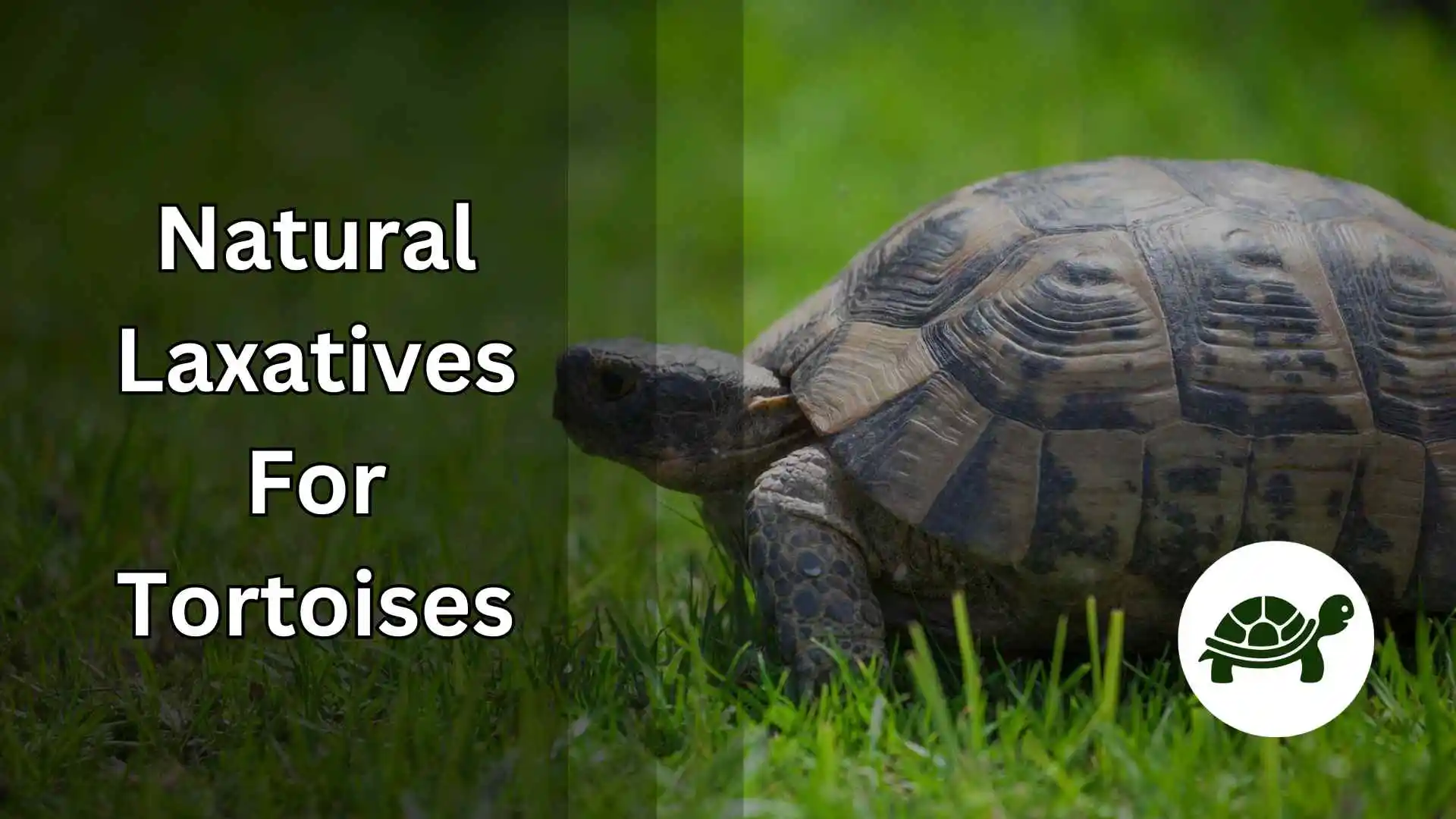Natural Laxatives for Tortoises – An Ultimate Guide
Are you worried about your tortoise’s sluggish digestion? Digestive issues in tortoises are more common than you might think, and they can lead to serious health complications if not addressed. This comprehensive guide aims to shed light on a gentle yet effective solution: natural laxatives for tortoises.
Understanding your tortoise’s digestive health is crucial for long-term well-being. From fresh fruits to leafy greens and even good old water, natural laxatives are a safe way to help your shelled friend get back on track. So if you’re looking to avoid chemical alternatives and seek a more organic approach, you’ve come to the right place.
In this post, we’ll delve into the fascinating world of tortoise digestion, identify the best natural laxatives you can offer, and guide you on how to administer them safely. Keep reading to give your tortoise the relief it needs, the natural way.
The Digestive System of a Tortoise
Ever wondered how your tortoise processes that delicious leafy green or juicy fruit you offer? Well, the digestive system of a tortoise is a unique and efficient machine designed for extracting nutrients from a variety of foods. Understanding this system is the first step toward optimizing your pet’s digestive health.
The digestive journey begins in the tortoise’s mouth, where food is broken down into smaller pieces before traveling down the esophagus. Once in the stomach, digestive enzymes work their magic, breaking the food down further. Finally, it moves through the intestines, where nutrients are absorbed, leaving the waste to be excreted. Sounds straightforward, right? However, issues like impaction or constipation can throw a wrench in this smoothly running system, causing discomfort or even severe health risks for your tortoise.
Identifying the signs of digestive issues early can make all the difference in your tortoise’s well-being. Look out for symptoms such as reduced activity, reluctance to eat, or unusual fecal matter. Armed with this knowledge and the right natural laxatives—which we’ll cover in detail later—you can effectively manage and even prevent these common digestive problems.
Why Consider Natural Laxatives?
When it comes to your tortoise’s digestive health, you might be tempted to reach for quick fixes like over-the-counter chemical laxatives. However, these options can come with their own set of drawbacks, including potential side effects and the risk of dependency. That’s why many tortoise owners are turning to natural laxatives as a safer, more sustainable solution for their pets.
Natural laxatives offer several benefits that synthetic ones simply can’t match. For starters, they integrate seamlessly with your tortoise’s regular diet, offering not just relief but also vital nutrients and hydration. Ingredients like fresh fruits, leafy greens, and water are not only effective at promoting regular bowel movements but are also easy on your tortoise’s system, minimizing the risk of adverse reactions.
Choosing a natural approach to your tortoise’s digestive woes shows an investment in their long-term health. Natural laxatives are not just about symptom relief; they contribute to a balanced and harmonious digestive system. So, let’s explore some of the best natural laxatives you can use to give your tortoise the relief it needs—without resorting to harsh chemicals.
Top Natural Laxatives for Tortoises
If you’re tired of watching your tortoise struggle with digestive issues, you’ll be relieved to know that there are effective, natural solutions readily available. Let’s dive into some of the best natural laxatives for tortoises, exploring what makes each one special and how to administer them safely.
Papaya

Papaya isn’t just a tropical delight; it’s also packed with enzymes like papain that help break down proteins and facilitate smoother digestion. Simply remove the seeds, cut the fruit into small, manageable pieces, and watch as your tortoise enjoys this delectable treat.
Watermelon

Nothing screams hydration like watermelon. With its high water content, this juicy fruit serves as a natural laxative, providing much-needed moisture to help soften stool. Given its sweetness, offer it as a treat in small portions to avoid sugar overload.
Dandelion Greens

These aren’t your average greens. Dandelion greens are rich in fiber, which aids in digestion and helps move things along the digestive tract. Plus, they offer a variety of essential nutrients like calcium and vitamin K, adding an extra layer of health benefits.
Clover

Clover is another fibrous green that can serve as a natural laxative for your tortoise. High in nutritional value, this plant is generally easy to digest and offers the dual benefits of relieving constipation while nourishing your pet.
Water as a Natural Laxative

Never underestimate the power of water. Regular soaking can greatly aid in the digestive process by keeping your tortoise hydrated. For smaller tortoises, a 15-20 minute soak in shallow, lukewarm water can help alleviate constipation symptoms.
Each of these natural laxatives comes with its own set of benefits and administering guidelines, but all share the common goal of aiding your tortoise’s digestive system in the most natural way possible. Integrating them into your pet’s diet will not only relieve current symptoms but can also act as a preventive measure for future digestive issues.
How to Administer Natural Laxatives
You’ve got your list of top natural laxatives for tortoises, but knowing what to use is only half the battle. How you administer these natural remedies is equally important for ensuring your tortoise’s digestive health improves without any hiccups. Let’s walk through some essential tips.
Portion Sizes
When it comes to fruits like papaya and watermelon, moderation is key. A small cube or slice is often sufficient for smaller tortoises, while larger tortoises may require a bit more. Always introduce new foods gradually and observe how your tortoise reacts.
Frequency
The ideal frequency varies depending on the laxative and the specific digestive issue your tortoise is facing. For instance, fruits like papaya can be given once a week, while leafy greens like dandelion greens could be a more regular part of the diet. Regular soaking sessions should also be scheduled—once or twice a week for most tortoises is a good starting point.
Combining with Regular Diet
Natural laxatives shouldn’t replace your tortoise’s standard diet but complement it. You can mix leafy greens in with your pet’s regular food or offer fruit slices as a special treat. Remember, balance is vital for long-term digestive health.
Signs that It’s working
After administering these natural remedies, keep a watchful eye on your tortoise. Signs of improved digestion include more frequent and softer stool, increased activity, and a more enthusiastic approach to eating. These are good indicators that you’re on the right track.
Administering natural laxatives effectively is crucial for leveraging their full benefits. By paying attention to portion sizes, frequency, and integrating these remedies into your tortoise’s regular diet, you’re setting the stage for optimal digestive health.
Precautions and Risks
While natural laxatives are a fantastic way to promote better digestive health in your tortoise, it’s essential to proceed with caution. Like anything in life, too much of a good thing can turn problematic. Here are some key precautions and risks you should be aware of when administering natural laxatives to your tortoise.
Foods to Avoid
While we’ve discussed beneficial foods, it’s also important to know what to steer clear of. Foods like iceberg lettuce and certain types of fruits can be high in sugar or oxalates, which can worsen digestive issues or lead to other health problems. Always do your research before introducing a new food item into your tortoise’s diet.
When to Consult a Veterinarian
While natural remedies can be effective, certain symptoms should not be ignored. If your tortoise shows signs of severe lethargy, blood in the stool, or a complete lack of appetite, consult your veterinarian immediately. These could be signs of a more serious underlying issue that needs professional intervention.
Risks Associated with Overuse
Natural doesn’t always mean risk-free. Overuse of even natural laxatives like fruits can lead to diarrhea, electrolyte imbalance, or nutrient deficiencies. It’s important to strike a balanced approach—use natural laxatives as a supplement, not a replacement, to a well-rounded diet.
Being mindful of these precautions and risks will not only help you administer natural laxatives safely but also ensure that you’re doing the best you can for your tortoise’s overall health and well-being. As always, when in doubt, consult a professional for tailored advice.
Frequently Asked Questions (FAQs)
Navigating your tortoise’s digestive health can feel like a maze of information. That’s why we’ve compiled a list of Frequently Asked Questions to help clarify some of the most common concerns surrounding the use of natural laxatives for tortoises.
1. How Often Should I Give My Tortoise a Natural Laxative?
The frequency depends on the specific issue you’re treating and the type of natural laxative you’re using. For fruits like papaya, once a week can be a good starting point. Leafy greens could be more regular, while water soaks could be weekly. Always observe your tortoise’s behavior and consult a vet for a tailored approach.
2. Can I Mix Different Types of Natural Laxatives?
Yes, different natural laxatives can often be combined for more effective relief. For example, you can mix dandelion greens with a small piece of watermelon for a fiber-rich and hydrating treat. However, always introduce new foods gradually and monitor your tortoise for any signs of discomfort or adverse reactions.
3. Do Natural Laxatives Expire?
Fresh foods like fruits and leafy greens have a limited shelf-life and should be given to your tortoise while they are still fresh. On the other hand, water for soaking doesn’t expire but should always be clean and free of contaminants. Check the freshness of your natural laxatives regularly to ensure they’re safe for consumption.
4. What Should I Do If My Tortoise’s Symptoms Don’t Improve?
If you’ve tried natural laxatives and your tortoise’s digestive issues persist or worsen, it’s crucial to consult a veterinarian for a comprehensive diagnosis and treatment plan. Some symptoms may indicate a more serious underlying condition that requires professional care.
5. Are Natural Laxatives Safe for All Tortoise Breeds?
Generally speaking, natural laxatives are safe for most tortoise breeds when administered correctly. However, different breeds may have unique dietary needs or sensitivities. Always consult with a veterinarian familiar with your specific breed to ensure you’re making the safest choices.
Your tortoise’s digestive health doesn’t have to be a mystery. With these FAQs, you’ll be better equipped to provide natural and effective care for your shelled companion. For any uncertainties not covered here, a consultation with a qualified veterinarian is always the best course of action.
Conclusion
Navigating the world of tortoise care, especially when it comes to digestive health, can be a daunting task. But with the right knowledge and resources, it doesn’t have to be. Natural laxatives offer a gentle, effective, and sustainable solution for relieving and preventing digestive issues in your tortoise. From hydrating fruits like watermelon to fiber-rich leafy greens and soothing water soaks, the options are plentiful and usually just a grocery trip away.
As you venture into using natural remedies, remember that moderation and observation are your best friends. Monitor your tortoise’s behavior, fecal matter, and overall well-being to ensure you’re on the right track. And don’t forget, when in doubt, consult a qualified veterinarian to address any severe or persistent issues that may arise.
In wrapping up, the road to optimal digestive health for your tortoise is one that requires attention, love, and a sprinkle of natural goodness. May your tortoise thrive with a happy tummy and an even happier life!







